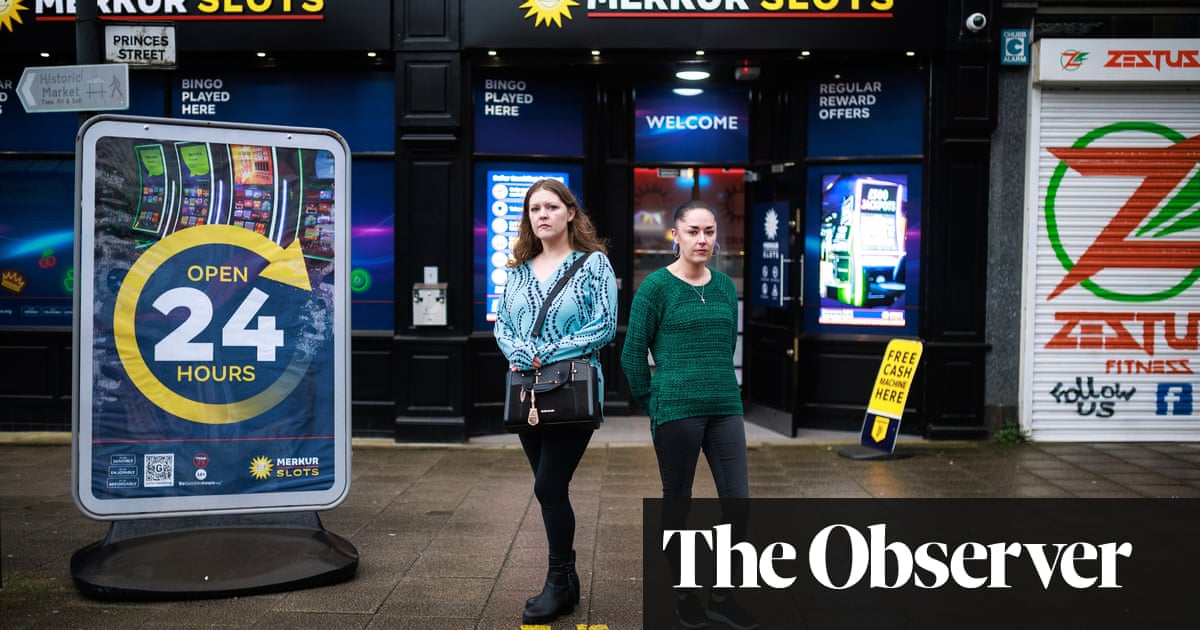
In the grip of slot machine addiction: ‘I’d keep loading £20s in. I could be in a daze’
As ‘adult gaming centres’ spread across the UK, one woman tells of how she kept playing even after getting a cancer diagnosis
Jackie Olden can pinpoint the troubling origin of her mum’s gambling addiction. “She was the kind of person who’d go to one shop where milk was a penny cheaper and another where bread was cheaper,” Olden recalls.
“This [gambling] would never have entered her head.”
But in 2008, her mother, Wendy Hughes, 64, took a job at the bookmaker Coral to make ends meet. At the time, digital roulette machines – known as fixed-odds betting terminals (FOBTs) – were a new feature of betting shops, one that was proving extremely lucrative.
Staff were encouraged to play the machines themselves every day, on a free demonstration setting, to stoke punters’ curiosity and drum up more business.
An email from Hughes’s manager at Coral, seen by the Observer, set out her instructions for the morning shift: “Clock in. Clean toilets. Play KBR [Key Bet Roulette] to generate interest.”
The enthralling graphics and high-octane gameplay captivated Hughes and she began to play – and lose – with real money. At the behest of her boss, she had begun a habit that would develop into a punishing addiction.
Spending so much on something as frivolous as gambling was totally out of character.
“Their father died when they were young so I had to be careful,” said Hughes. “They never got things they didn’t need and I wouldn’t even spend a pound on the lottery.”
But as the years went by, Hughes was transformed into the kind of person who could feed thousands of pounds of her pension money into a slot machine within a few days.
Battling addiction, she signed up to the bookmakers’ national self-exclusion scheme, which shuts out punters with a gambling problem from betting shops. But that scheme does not apply to “adult gaming centres”, the high street venues packed full of slot machines.
Hughes was diagnosed with lung cancer in April 2023. The disease – and the treatment that it required – left her frail, exhausted, and painfully thin. Yet somehow, the addiction drew her back to the machines time and again.
Hughes’s spiral of self-destruction is set out in black and white in internal company records obtained from Merkur, the German-owned operator of a venue in Stockport where she spent hours feeding the machines.
Things came to a head between 1 and 3 November 2023. The documents – obtained by Hughes via a subject access request and shared with the Observer – show that she lost just under £2,000 over two days, including a session that lasted almost 12 hours.
Merkur’s Stockport venue is one of many that has a 24-hour licence. When Hughes had burned through her bank’s daily withdrawal limit, she simply waited until midnight and went to the cash machine for more.
Internal records show that staff knew she was doing this. They even reserved her favourite machine with a “hold card”, a practice that exploits customers’ irrational belief that a long losing streak on one terminal must surely end in a jackpot soon.
Hughes could have withdrawn money inside the venue – Merkur helpfully provides a cash machine – but did not wish her daughters to see from her bank statements where she had been.
Despite the warning signs, staff did not, at any point, check that she was in control of her gambling.
Hughes would find money to feed the machines wherever she could. When she hit the ATM limits, she would go to Asda to buy a packet of crisps and get cashback. She took out short-term, high-interest loans, even a loan against her home.
“It started off as a few hours and then it would get longer and longer. Even when I won, I’d carry on and lose it all,” she said. “I just keep loading the £20s in. Sometimes I’m in such a daze that I don’t really care any more.”
Merkur has offered to refund Hughes’s losses from that November 2023 session via a “one-off ex gratia payment” of £1,981.60.
But Jackie thinks her mother’s losses over the longer term could be four times that high.
Nor is she willing to accept a payout when she does not believe that the company has accepted the gravity of the circumstances. One internal memo dismissed Hughes’s cancer as a factor in her losses, insisting that it “does not impair her cognitive ability”.
Hughes has been left mentally battered and financially devastated, but Merkur is thriving. It reported turnover of £173m in the UK in the year to 2022 and is investing in a “UK expansion project”. It has submitted a series of planning and licence applications around the country, backed by costly teams of lawyers and consultants.
Merkur’s ultimate owner – the billionaire Gauselmann family headed by 89-year-old Paul Gauselmann, who went into the business after installing jukeboxes in his spare time – is worth $2.5bn (£1.9bn), according to Forbes.
Merkur said: “We take any allegations against our staff extremely seriously,” adding that Hughes’s case had been “fully investigated” and reported to the Gambling Commission in January.
“We have established that the customer interaction measures recommended by the Gambling Commission were fully in place.
“Regrettably, it would appear that on this occasion individual members of staff at our Stockport venue fell short of what was required of them. Extensive retraining has taken place.”
Entain, which owns Coral following a series of mergers and acquisitions, declined to comment.
